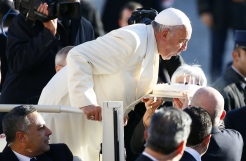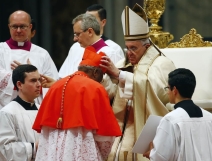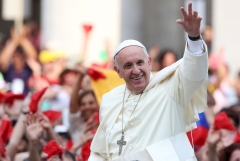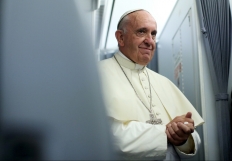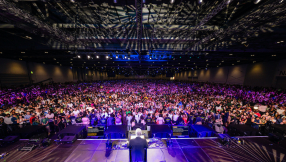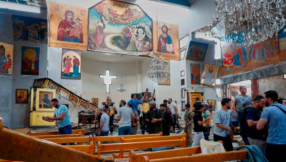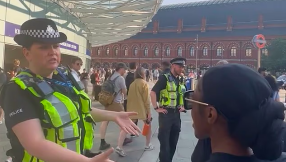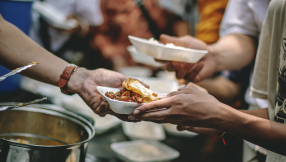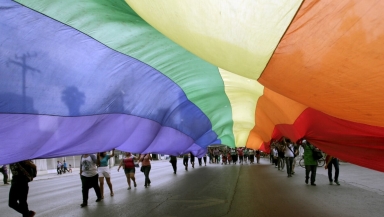
Earlier this week, Catholic LGBT advocates received some disappointing, if not unexpected, news. They were told that a number of meetings scheduled to be held at St John the Evangelist Church in Philadelphia would not be allowed to take place.
Why the controversy? The programme of events was scheduled to coincide with the World Meeting of Families, which will welcome Pope Francis on his first papal trip to the US later this month. LGBT advocacy groups had previously been told that openly gay and transgender Catholics would be welcome at the conference, but they were forbidden from lobbying, or giving presentations. Equally Blessed, a coalition of four Catholic organisations that work on behalf of LGBT people and their families, therefore planned its own workshop on gender identity to be held at St John's, a Catholic church less than half a mile from from the Pennsylvania Conference Centre where the congress is being held, on agreement with the church's pastor. The church would also be used as a base for 14 families with LGBT members who are making a pilgrimage to the summit.
However, Equally Blessed have now been forced from their venue, a decision that the Philadelphia Archdiocese maintains was made by the parish. Activists are accusing the Catholic Church of "literally kick[ing] trans people out".
Following the news that it would no longer be able to hold its event at St John's, a statement from Equally Blessed – which comprises Call to Action, DignityUSA, Fortunate Families and New Ways Ministry – said the group was "saddened, frustrated, and deeply disappointed" by the decision.
"Unfortunately, this is yet another instance of the kind of exclusion LGBT Catholics and supporters have endured for decades....While we know the Church is the people of God and not a building, it is still very painful to be told we or our loved ones are not welcome in our own home," the statement read.
"Actions like the Archbishop's strengthen our resolve to keep working for the day when Catholicism is truly a Church for all people."
Director of communications for Call to Action, Ryan Hoffman, confirmed to Christian Today that Equally Blessed had originally received permission from the pastor at St John's to hold its workshop and pilgrimage at the church. "We're a little unsure what happened from there, because neither the pastor nor the Archdiocese will talk to us...but what's clear is that the pastor felt strong-armed in rescinding his decision to allow us to use their church and facilities, because in our previous conversation he felt very open, and said his community was very open to having us there," he said.
In a statement to Christian Today, director of communications for the Archdiocese of Philadelphia, Kenneth Gavin, said that "Decisions regarding programs offered at parishes throughout the Archdiocese of Philadelphia are made at the local level at each individual parish. It is expected, however, that any parish sponsored activities would feature content that is in line with Church teaching."
Gavin added that this expectation applies to all matters, and "If Archdiocesan administration were to become aware of any activities to the contrary it would be their responsibility to look into the matter and ask that appropriate corrective action be taken. In this case, the Archdiocese was asked to evaluate the program and provide guidance, which it did.
"The end decision was made locally by the parish. The Archdiocese fully supports the decision. Focusing on this particular matter as LGBT related only would be short-sighted. It's not about the individuals; it's about the content of the programming and a consistent ethic regarding the meaning and purpose of human sexuality in the Catholic tradition."
"Our Congress will be a global one," he added. "As such, it wouldn't be productive to focus on one issue alone. We're also going to take a hard look at how things like poverty, incarceration, technology access, health and wellness, and many other matters can be an impediment to family life."
The retraction has caused some controversy in the LGBT community. Julie Chovanes, a lawyer and transgender woman scheduled to speak at the workshop, told the Philadelphia Inquirer: "It's an amazing thing, especially if you're trying to show families we are part of the human family. I still consider myself a Catholic, but apparently, the Church doesn't."
Hers is a sentiment shared by many LGBT advocates who feel alienated by the Catholic Church, which affirms a traditional stance on marriage as between a man and a woman. The official teaching states that "Although the particular inclination of the homosexual person is not a sin, it is a more or less strong tendency ordered toward an intrinsic moral evil; and thus the inclination itself must be seen as an objective disorder."
Equally Blessed and its programming "is about celebrating our LGBT brothers and sisters and affirming who they are, and wanting them to make healthy decisions around their sexuality, not to repress it," Hoffman said. "We're about celebrating that gift of being gay, lesbian, trans or questioning, and having open and honest dialogue about what that means in a safe space."
He seemed unsurprised that this objective had been met with opposition from the Philadelphia Archdiocese, but said it is vital that the perspectives of LGBT Catholics are listened to, not least because their inclusion in the Church is supported by a "large majority" of the faithful in the US.
Statistics suggest that Catholics, particularly in America, are more liberal on LGBT issues than Church doctrine might suggest. According to Pew Research, just under 60 per cent of Catholics polled in 2015 expressed support for same-sex marriage. A number of bishops have also broken episcopal ranks and called for the recognition of gay relationships in the Church.
Gavin said that while the Church teaches that marriage is between a man and a woman, it also "instructs all of us to extend Christian charity to all people and show them the love of God...What seems to have gotten lost in all of the noise lately is that it is very much possible to show Christian charity and love for all even if you disagree with their point of view.
"Simply put, it is not only possible, but also essential to be faithful to Church teaching regarding how we interact with one another and uphold the sanctity of marriage at the same time."
It's a complex issue, but those working on behalf of LGBT Catholics insist that theirs is a voice that needs to be heard, not shut out. It's why the Equally Blessed pilgrims will still be attending the World Meeting of Families, to speak with lay Catholics and open dialogue about the issues they are facing. "Catholics are the most welcoming and inclusive Christian denomination in terms of LGBT issues in the US," Hoffman explained.
"The people in the pews are welcoming and embracing their LGBT brothers and sisters, and that's really who we're going to dialogue with."
As for speaking to leaders in the Catholic Church about becoming more inclusive, Hoffman laughed. "You could say the ship has sailed there," he said. "But whether we're part of the official programme or not, we'll be holding conversations at breaks, during meal times, or at a church across the street" – the coalition has been welcomed by the Arch Street United Methodist Church and will be holding its workshop there. It's even closer to the summit's venue than St John's.
Of the pope's stance on LGBT issues, Hoffman said his position is unclear, but the Church has at least shifted its posture towards LGBT Catholics since he took office. Francis has met with transgender and gay people and is generally considered to have adopted a more gentle tone than his predecessors, but his encyclical on the environment released in June this year has been criticised by LGBT activists for placing emphasis on the importance of gender differences.
"The acceptance of our bodies as God's gift is vital for welcoming and accepting the entire world as a gift from the Father and our common home, whereas thinking that we enjoy absolute power over our own bodies turns, often subtly, into thinking that we enjoy absolute power over creation," Francis wrote.
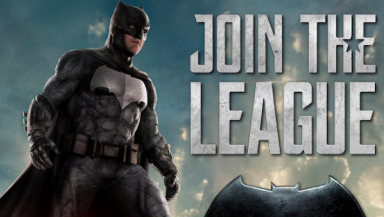
"Learning to accept our body, to care for it and to respect its fullest meaning, is an essential element of any genuine human ecology. Also, valuing one's own body in its femininity or masculinity is necessary if I'm going to be able to recognise myself in an encounter with someone who is different...It is not a healthy attitude which would seek to cancel out sexual difference because it no longer knows how to confront it."
He has also criticised gender theory, which he says "does not recognise the order of creation" and has repeatedly stressed his belief that children flourish best with heterosexual parents. Though heralded by many as a progressive and praised for changing the conversation on LGBT issues in the Church, advocacy groups remain sceptical of just how liberal the Pope is actually willing to be.
"Pope Francis is much more open to discussing the lived experience of Catholics," Hoffman said. "His posture has created an openness to at least talk about [the issues]." He believes that there has been a "pivot to a more expansive vision of what Catholicism could be" under Francis' leadership.
However, the reality is that there has been no doctrinal shift on homosexuality. "It's a little unclear what Francis wants. Sometimes he says stuff that is very pro-LGBT, and then at times he rocks that back," Hoffman said.
"The new tone and shift have been a welcome change from Benedict, but we need a change in the Church's teaching itself. We could have another pope tomorrow, and could be taken back to a culture of fear."










